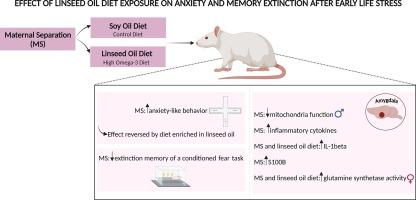亚麻籽油饮食对早期生活压力后焦虑和记忆消失的影响:对杏仁核线粒体功能障碍、星形胶质细胞标记物和炎症的性别特异性分析
IF 2.7
4区 医学
Q3 NEUROSCIENCES
引用次数: 0
摘要
早期暴露于压力源会影响机体对刺激的反应、一生中的情绪状态以及如何处理情绪记忆。因此,它可能会影响日后对精神病理学的易感性。我们利用母体分离造成的早期压力动物模型,研究了母体分离对成年后厌恶记忆和焦虑样行为的消退可能产生的影响,以及母体分离对杏仁核线粒体功能、炎症和星形胶质细胞标志物的影响。我们还评估了富含亚麻籽油(因富含欧米伽-3 脂肪而闻名)的饮食是否可用于减轻早期应激对行为和神经化学的影响。Wistar大鼠的幼仔被分为对照组(完整)或母体分离组(MS)。在断奶时,它们又被分成两组,分别接受富含大豆或亚麻籽的等热量饮食。成年后,动物暴露于空旷场地和高架迷宫,以评估探索活动和焦虑行为。它们还接受了恐惧条件反射训练,之后接受了消退训练,接着进行了测试以评估消退记忆。对杏仁的炎症细胞因子(白细胞介素(IL)-1β、IL-6和肿瘤坏死因子(TNF)-α)、线粒体功能和星形胶质细胞标记物(胶质纤维酸性蛋白-GFAP、S100B和谷氨酰胺合成酶活性)进行了评估。多发性硬化症会在高架迷宫中诱发类似焦虑的行为,而从断奶开始提供富含亚麻籽油的饮食可逆转这种行为。在测试恐惧条件反射的消退记忆时,多发性硬化症动物表现出更多的冻结行为。接受富含亚麻籽油饮食的多发性硬化症雄性动物杏仁核中的线粒体功能较低。此外,多发性硬化症会导致炎症细胞因子(尤其是 IL-1beta)增加,而富含亚麻籽油的饮食会进一步提高多发性硬化症动物体内的炎症细胞因子水平。多发性硬化症还会增加 S100B 的水平。这些结果表明,多发性硬化症动物的情绪更加激动,炎性细胞因子和 S100B 水平更高。虽然富含亚麻籽油的饮食可减轻焦虑样行为,但它进一步改变了杏仁核 IL-1beta 并降低了线粒体的功能,尤其是在雄性动物中。多发性硬化还增加了杏仁核中谷氨酰胺合成酶的活性,当动物摄入富含亚麻籽油的食物时,这种效应更高,尤其是雌性动物。总之,这些结果表明 MS 会影响动物的情绪行为和杏仁核的神经化学变化,并具有性别特异性。虽然富含亚麻籽油的饮食似乎能够逆转某些多发性硬化症的行为影响,但必须谨慎考虑这些结果,因为接受富含亚麻籽油饮食的多发性硬化症动物的生化指标可能会恶化。这些知识对于了解旨在逆转早期应激效应的策略的作用机制非常重要,今后有必要开展研究,以确定促进复原力的可能干预措施。本文章由计算机程序翻译,如有差异,请以英文原文为准。

Impacts of linseed oil diet on anxiety and memory extinction after early life stress: A sex-specific analysis of mitochondrial dysfunction, astrocytic markers, and inflammation in the amygdala
Early exposure to stressors affects how the organism reacts to stimuli, its emotional state throughout life, and how it deals with emotional memories. Consequently, it may affect susceptibility to psychopathology later in life. We used an animal model of early stress by maternal separation to study its potential impact on the extinction of aversive memories and anxiety-like behavior in adulthood, as well as its effects on mitochondrial functionality, inflammatory and astrocytic markers in the amygdala. We also assessed whether a diet enriched with linseed oil, known for its high content in omega-3 fats, could be used to attenuate the behavioral and neurochemical effects of early stress. Litters of Wistar rats were divided into controls (intact) or subjected to maternal separation (MS). They were subdivided into two groups receiving isocaloric diets enriched in soy or linseed oils at weaning. In adulthood, the animals were exposed to the open field and the elevated plus maze, to evaluate exploratory activity and anxiety-like behavior. They were also trained in a context of fear conditioning, and afterward subjected to an extinction session, followed by a test session to evaluate the extinction memory. Amygdalae were evaluated for inflammatory cytokines (interleukin (IL)-1beta, IL-6, and tumor-necrose factor (TNF)-alpha), mitochondrial functionality, and astrocyte markers (glial fibrillary acidic protein − GFAP, S100B, and glutamine synthetase activity). MS induced anxiety-like behavior in the elevated plus-maze, which was reversed by a diet enriched in linseed oil offered from weaning. When testing the memory of an extinction session of fear conditioning, MS animals showed more freezing behavior. MS males receiving a linseed oil-enriched diet had lower functional mitochondria in the amygdala. In addition, MS led to increased inflammatory cytokines, particularly IL-1beta, and the diet enriched in linseed oil further increased these levels in MS animals. MS also increased S100B levels. These results point to a higher emotionality presented by MS animals, with higher levels of inflammatory cytokines and S100B. While a diet enriched in linseed oil attenuated anxiety-like behavior, it further altered amygdala IL-1beta and reduced mitochondria functionality, particularly in males. MS also increased glutamine synthetase activity in the amygdala, and this effect was higher when the animals received a diet enriched in linseed oil, particularly in females. In conclusion, these results point to MS effects on emotional behavior, and neurochemical alterations in the amygdala, with sex-specific effects. Although a diet enriched in linseed oil appears to be able to reverse some of MS behavioral effects, these results must be considered with caution, since biochemical parameters could be worsened in MS animals receiving a linseed oil-enriched diet. This knowledge is important for the understanding of mechanisms of action of strategies aiming to reverse early stress effects, and future studies are warranted to determine possible interventions to promote resilience.
求助全文
通过发布文献求助,成功后即可免费获取论文全文。
去求助
来源期刊

Brain Research
医学-神经科学
CiteScore
5.90
自引率
3.40%
发文量
268
审稿时长
47 days
期刊介绍:
An international multidisciplinary journal devoted to fundamental research in the brain sciences.
Brain Research publishes papers reporting interdisciplinary investigations of nervous system structure and function that are of general interest to the international community of neuroscientists. As is evident from the journals name, its scope is broad, ranging from cellular and molecular studies through systems neuroscience, cognition and disease. Invited reviews are also published; suggestions for and inquiries about potential reviews are welcomed.
With the appearance of the final issue of the 2011 subscription, Vol. 67/1-2 (24 June 2011), Brain Research Reviews has ceased publication as a distinct journal separate from Brain Research. Review articles accepted for Brain Research are now published in that journal.
 求助内容:
求助内容: 应助结果提醒方式:
应助结果提醒方式:


